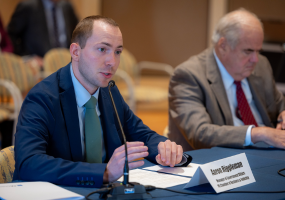 Pennsylvania’s employers face a critical labor shortage. Only 66 available workers exist for every 100 open jobs. The PA Chamber is leading efforts to change this by intensifying its collaboration with educational institutions and industry partners to strengthen career pipelines and workforce development – key priorities in the PA Chamber’s Keystone Initiative, our long-term economic strategy to make Pennsylvania more competitive.
Pennsylvania’s employers face a critical labor shortage. Only 66 available workers exist for every 100 open jobs. The PA Chamber is leading efforts to change this by intensifying its collaboration with educational institutions and industry partners to strengthen career pipelines and workforce development – key priorities in the PA Chamber’s Keystone Initiative, our long-term economic strategy to make Pennsylvania more competitive.
During a recent Senate Republican Policy Committee hearing at Lycoming College, PA Chamber Manager of Government Affairs Aaron Riggleman testified that higher education must be central to Pennsylvania’s workforce strategy. His message was clear: “Pennsylvania cannot afford to invest in educating students only to watch them leave.”
To retain graduates, Riggleman called for expanded internships, co-op experiences, and employer partnerships that connect today’s students directly with employers who can offer them exciting career opportunities in Pennsylvania. The PA Chamber’s Keystone Initiative identified these workforce development strategies as effective ways to strengthen career pipelines.
Riggleman highlighted successful collaborations between colleges and employers, such as nursing programs that have expanded to meet healthcare demands and engineering partnerships that support the manufacturing sector. These examples underscore Pennsylvania’s higher education institutions’ vital role in preparing students for in-demand careers and enhancing the state’s economic competitiveness.
Industry leaders echoed this call for stronger school-employer ties. Bill DesRosiers, Manager of Government and External Affairs at Coterra Energy, shared that his company has invested nearly $20 million in scholarships, career and technical centers, and workforce development programs across the Commonwealth.
DesRosiers spotlighted partnerships with Lackawanna College’s School of Petroleum and Natural Gas, Penn College of Technology, and the Susquehanna County Career & Technology Center. Initiatives such as welding, CDL training, and dual enrollment programs have opened career pathways for thousands of students.
He emphasized that these investments are intentional steps to build the workforce Pennsylvania industries need. He urged lawmakers to expand funding for career and technical centers, increase access to programs like the Educational Improvement Tax Credit and the Neighborhood Assistance Program, and support innovation through immersive technologies such as virtual reality training.
“Without a skilled workforce, the energy industry cannot thrive, communities cannot grow, and Pennsylvania will struggle to attract new industries and investment,” DesRosiers testified.
The hearing also addressed challenges facing many Pennsylvania colleges and universities, including declining enrollment and demographic shifts. Riggleman urged lawmakers to modernize and strengthen the higher education system to ensure it remains a powerful engine for opportunity and growth.
The PA Chamber’s Keystone Initiative recognizes that building, attracting, and retaining a skilled workforce is not just an education issue; it’s an economic imperative. By fostering stronger ties between academia and industry, Pennsylvania can position itself as a leader in workforce innovation and secure a brighter future for its residents and businesses.